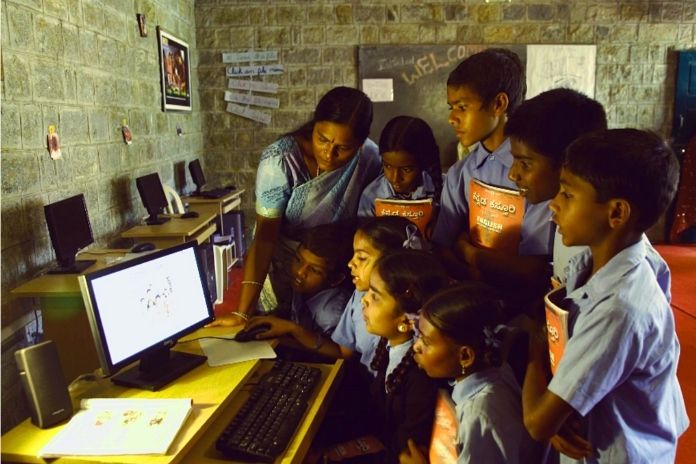The advancement of the topic of digital schools is on everyone’s lips in times of Corona.Pupils study outdoors, equipped with different devices, they listen to a teacher of their choice.
Skills are not assessed based on written tests but instead based on their on-site performance.What are we talking about? Welcome to the future of education! With its new forms of teaching and the orientation towards a digitized (professional) life, the digital School can offer essential perspectives.
The Future Of Education
Technology is rapidly changing the world around us, so many people fear that technology could replace human intelligence. Some educators suggest that in the not too distant future, there will be no more learners to be taught as technology could take over many of the tasks and skills we have been teaching our students for decades.
The thing is, education won’t go away. It will only take other forms, such as in a digital school.
Digital School – A Definition
The term digital school means that the entire school process of education is fundamentally changing with the use of digital media and the educational goal. Digital education is an ongoing process that enables people to actively shape their (professional) life and learning in a digitized world. Through more opportunities to participate in the design of the lessons and the curricula, pupils are involved even more actively.
The Digital School Brings New Forms Of Teaching
Lessons in a digital school could be fundamentally different in comparison to conventional classes. For example, the type of learning, by what means, when, and where.
Let’s take a closer look at a few of these aspects:
- Personalized learning
The pupils and students could learn with tools that adapt to the skills of the learner. This means that an above-average number of learners would be confronted with more challenging tasks and questions once a certain level has been reached. Learners who have difficulty with a subject may be allowed to practice more until they reach the required level.
Using these methods, the digital School would positively strengthen the pupils and students in their learning processes. This could lead to positive learning experiences so that fewer learners lose confidence in their academic skills. In addition, teachers would be able to identify which students need help in which areas.
- Free Choice Of The Learning Process
Although every subject taught is geared towards the same goal, the path to get there can be different from person to person. Similar to the personalized learning experience, learners would modify their learning process with tools they deem necessary for themselves.
Learners could learn using different devices, programs, and techniques, depending on their preferences. Integrated learning on the preferred device is an essential factor in this change.
- Regardless Of Time And Place
Learners could have more opportunities to study in different places at different times. E-learning tools facilitate the possibilities of self-study. The traditional classroom would be flipped in the digital School, meaning that the theoretical part is learned outside the School. At the same time, the practical aspect is taught face-to-face and interactively.
- Project-Based Learning
As professional careers adapt to the future freelance economy, today’s digital school learners will adapt to project-based learning and working. That means they would have to learn how to apply their skills to a wide variety of situations in less time.
The pupils should familiarize themselves with project-based learning in School. At this point, organizational, collaborative, and time management skills could be taught as basics that any student can use in their further academic career.
- Practical Experience
As technology enables digital schools to be more efficient in certain areas, curricula will make room for skills that require only human knowledge and personal interaction. Therefore, the focus in the courses and classes will be on practical experience.
Schools will provide more opportunities for learners to acquire practical skills that are representative of their work. The curricula will offer the students more space for internships, supervised projects, and cooperation projects.
- Data Evaluation
While math is viewed as one of three literacy skills, there is no doubt that the manual portion of those literacy skills may become irrelevant shortly. Computers will soon be doing all statistical analysis, describing and analyzing data, and predicting future trends.
Hence, human interpretation of this data will become a much more critical part of future curricula. Applying theoretical knowledge to numbers and using human reasoning to derive logic and trends from that data will become a radically new aspect of this skill.
- Exams could change
As educational software platforms assess learners’ abilities at each step, measuring their competencies through questions and answers may become irrelevant or insufficient. Many argue that exams are now designed so that learners would cram their material until the exam and forget a lot the next day.
Teachers fear that exams may not reliably measure what learners should be able to do when they first start their careers. Since the actual knowledge can be measured during his learning process, the application of his ability can best be tested when he works on projects on site.
- Accompaniment Is Becoming More And More Critical
In a few years, learners may have built so much independence into their learning process that guidance from the teaching staff could be fundamental to the learners’ success. The teachers will form a central point in a sea of information through which the learners would have to work their way.
Although the future of education seems far off, the teacher and educational institution remain vital to academic performance even in a digital school.

